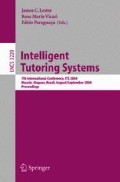Abstract
Hints are an important ingredient of natural language tutorial dialogues. Existing models of hints, however, are limited in capturing their various underlying functions, since hints are typically treated as a unit directly associated with some problem solving script or discourse situation. Putting emphasis on making cognitive functions of hints explicit and allowing for automatic incorporation in a natural dialogue context, we present a multi-dimensional hint taxonomy where each dimension defines a decision point for the associated function. Hint categories are then conceived as convergent points of the dimensions. So far, we have elaborated four dimensions: (1) domain knowledge, (2) inferential role, (3) elicitation status, (4) problem referential perspective. These fine-grained distinctions support the constructive generation of hint specifications from modular knowledge sources.
Access this chapter
Tax calculation will be finalised at checkout
Purchases are for personal use only
Preview
Unable to display preview. Download preview PDF.
References
Ashley, K.D., Desai, R., Levine, J.M.: Teaching case-based argumentation concpets using dialoectic arguments vs. didactic explanations. In: Proceedings of the 6th International Conference on Intelligent Tutoring Systems, pp. 585–595 (2002)
Benzmüller, C., Fiedler, A., Gabsdil, M., Horacek, H., Kruijff-Korbayová, I., Pinkal, M., Siekmann, J., Tsovaltzi, D., Vo, B.Q., Wolska, M.: Tutorial dialogs on mathematical proofs. In: Proceedings of the IJCAI Workshop on Knowledge Representation and Automated Reasoning for E-Learning Systems, Acapulco, pp. 12–22 (2003)
Benzmüller, C., Fiedler, A., Gabsdil, M., Horacek, H., Kruijff-Korbayová, I., Pinkal, M., Siekmann, J., Tsovaltzi, D., Vo, B.Q., Wolska, M.: A Wizard-of-Oz experiment for tutorial dialogues in mathematics. In: aied03 Supplementary Proceedings, Workshop on Advanced Technologies for Mathematics Education, Sidney, Australia, pp. 471–481 (2003)
Berry, D., Broadbent, D.: On the relationship between task performance and the associated verbalizable knowledge. Quarterly Journal of Experimental Psychology 36(A), 209–231 (1984)
Chi, M.T.H., Glaser, R., Rees, E.: Expertise in problem solving. Advances in the Psychology of Human Intelligence, 7–75 (1982)
Chi, M.T.H., de Leeuw, N., Chiu, M.-H., Lavancher, C.: Eliciting self-explanation improves understanding. Cognitive Science 18, 439–477 (1994)
Fiedler, A., Gabsdil, M., Horacek, H.: A Tool for Supporting Progressive Refinement ofWizard-of-Oz Experiments in Natural Language. In: Intelligent Tutoring Systems — 6th International Conference, ITS 2002 (2004) (in print)
Fiedler, A., Tsovaltzi, D.: Automating hinting in mathematical tutorial dialogue. In: Proceedings of the EACL 2003 Workshop on Dialogue Systems: Interaction, Adaptation and Styles of Management, Budapest, pp. 45–52 (2003)
Heffernan, N.T., Koedinger, K.R.: Building a 3rd generation ITS for symbolization: Adding a tutorial model with multiple tutorial strategies. In: Proceedings of the ITS 2000 Workshop on Algebra Learning, Montréal, Canada (2000)
Hume, G., Michael, J., Rovick, A., Evens, M.: Student responses and follow up tutorial tactics in an ITS. In: Proceedings of the 9th Florida Artificial Intelligence Research Symposium, KeyWest, FL, pp. 168–172 (1996)
Hume, G.D., Michael, J.A., Allen, R.A., Evens, M.W.: Hinting as a tactic in one-on-one tutoring. Journal of the Learning Sciences 5(1), 23–47 (1996)
Lewicki, P., Hill, T., Czyzewska, M.: Nonconscious acquisition of information. Journal of American Psychologist 47, 796–801 (1992)
Lim, E.L., Moore, D.W.: Problem solving in geometry: Comparing the effects of non-goal specific instruction and conventional worked examples. Journal of Educational Psychology 22(5), 591–612 (2002)
Matsuda, N., VanLehn, K.: Modelling hinting strategies for geometry theorem proving. In: Proceedings of the 9th International Conference on User Modeling, Pittsburgh, PA (2003)
Melis, E., Ullrich, C.: How to Teach it - Polya-Inspired Scenarios In ActiveMath. In: Proceedings of, Biarritz, France, pp. 141–147 (2003)
Moore, J.: What makes human explanations effective? In: Proceedings of the Fifteenth Annual Meeting of the Cognitive Science Society, Hillsdale, NJ (1993)
Person, N.K., Graesser, A.C., Harter, D., Mathews, E., The Tutoring Research Group: Dialog move generation and conversation management in AutoTutor. In: Rosé, C.P., Freedman, R. (eds.) Building Dialog Systems for Tutorial Applications—Papers from the AAAI Fall Symposium, North Falmouth, MA, pp. 45–51. AAAI press, Menlo Park (2000)
Rosé, C.P., Moore, J.D., VanLehn, K., Allbritton, D.: A comparative evaluation of socratic versus didactic tutoring. In: Moore, J., Stenning, K. (eds.) Proceedings 23rd Annual Conference of the Cognitive Science Society, University of Edinburgh, Scotland (2001)
Siekmann, J., Benzmüller, C., Brezhnev, V., Cheikhrouhou, L., Fiedler, A., Franke, A., Horacek, H., Kohlhase, M., Meier, A., Melis, E., Moschner, M., Normann, I., Pollet, M., Sorge, V., Ullrich, C., Wirth, C.-P., Zimmer, J.: Proof development with Ω MEGA. In: Voronkov, A. (ed.) CADE 2002. LNCS (LNAI), vol. 2392, pp. 144–149. Springer, Heidelberg (2002)
Sweller, J.: Cognitive technology: Some procedures for facilitating learning and problem solving in mahtematics and science. Journal Educational Psychology 81, 457–466 (1989)
Tsovaltzi, D., Fiedler, A.: An approach to facilitating reflection in a mathematics tutoring system. In: aied03 Supplementary Proceedings,Workshop on Learner Modelling for Reflection, Sydney, Australia, pp. 278–287 (2003)
Tsovaltzi, D., Fiedler, A.: Enhancement and use of a mathematical ontology in a tutorial dialogue system. In: Proceedings of the IJCAI Workshop on Knowledge and Reasoning in Practical Dialogue Systems, Acapulco, Mexico, pp. 19–28 (2003)
Tsovaltzi, D., Karagjosova, E.: A dialogue move taxonomy for tutorial dialogues. In: Proceedings of 5th SIGdialWorkshop on Discourse and Dialogue, Boston, USA (2004) (in print)
Weiner, B.: Human Motivation: metaphor, theories, and research. Sage Publications Inc., Thousand Oaks (1992)
Wilson, B., Cole, P.: Cognitive teaching models. In: Jonassen, D.H. (ed.) Handbook of Research for educational communications and technology, MacMillan, Basingstoke (1996)
Wu, H.: What is so difficult about the preparation of mathematics teachers. In: National Summit on the Mathematical Education of Teachers: Meeting the Demand for High Quality Mathematics Education in America (November 2001)
Author information
Authors and Affiliations
Editor information
Editors and Affiliations
Rights and permissions
Copyright information
© 2004 Springer-Verlag Berlin Heidelberg
About this paper
Cite this paper
Tsovaltzi, D., Fiedler, A., Horacek, H. (2004). A Multi-dimensional Taxonomy for Automating Hinting. In: Lester, J.C., Vicari, R.M., Paraguaçu, F. (eds) Intelligent Tutoring Systems. ITS 2004. Lecture Notes in Computer Science, vol 3220. Springer, Berlin, Heidelberg. https://doi.org/10.1007/978-3-540-30139-4_73
Download citation
DOI: https://doi.org/10.1007/978-3-540-30139-4_73
Publisher Name: Springer, Berlin, Heidelberg
Print ISBN: 978-3-540-22948-3
Online ISBN: 978-3-540-30139-4
eBook Packages: Springer Book Archive

